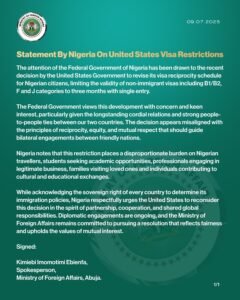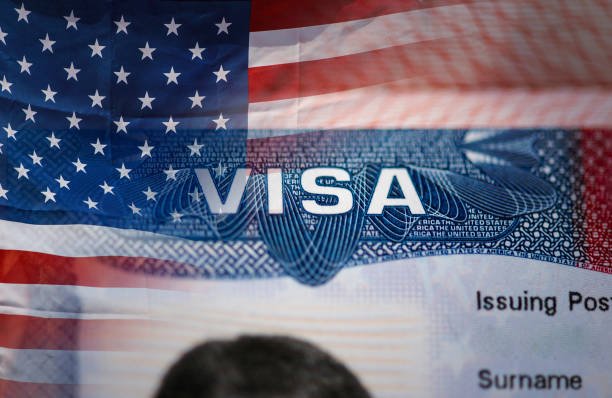The Nigerian government has formally appealed to the United States to review its newly revised visa policy that restricts non-immigrant visas for Nigerians to a single entry valid for just three months.
The appeal was made in an official statement released on Wednesday by Kimiebi Ebienfa, spokesperson for Nigeria’s Ministry of Foreign Affairs. The policy revision by the U.S. affects categories such as B1/B2 (business and tourism), F (students), and J (exchange visitors).
“The federal government views this development with concern, especially considering the longstanding relationship and strong people-to-people ties between Nigeria and the United States,” the statement read. “This move appears inconsistent with the principles of reciprocity, equity, and mutual respect expected in diplomatic engagements between friendly nations.”
Nigeria argues that the new restriction places an undue burden on its citizens—impacting students, professionals, families, and cultural exchange participants—who require easier access to the United States for legitimate purposes.
While acknowledging that every country reserves the right to determine its immigration policies, the Nigerian government urged Washington to reconsider the rule change “in the spirit of partnership and shared global responsibilities.” Ebienfa added that diplomatic efforts are ongoing to resolve the matter in a way that reflects fairness and mutual respect.

UAE Tightens Visa Restrictions for Nigerians
Coinciding with Nigeria’s diplomatic outreach to the U.S., the United Arab Emirates (UAE) also announced stricter visa requirements for Nigerian citizens, effective July 8, 2025.
According to the new UAE regulations, Nigerian nationals between the ages of 18 and 45 will no longer be eligible for tourist visas unless they are sponsored or meet specific, yet undisclosed, conditions. Transit visas have also been suspended for Nigerians, effectively prohibiting stopovers en route to other destinations.
In a further tightening of the rules, Nigerians above the age of 45 applying for tourist visas must now present a personal six-month bank statement showing a minimum monthly balance of $10,000 or the naira equivalent. Additionally, applicants must provide proof of hotel reservations and evidence of at least 5,000 dirhams in available funds to cover their stay.
These new measures follow the lifting of a two-year visa ban on Nigerians by the UAE in 2023. Despite expectations of improved travel ties after the ban was lifted and Emirates Airlines resumed operations to Nigeria, the latest developments suggest a reversal of that trend.
Industry experts say the policy shift could drastically reduce the number of Nigerian travellers to Dubai, a longstanding hub for tourism, business, and trade. Travel agents, concerned about the mounting restrictions, warn that more limitations may be introduced in the future.
The latest visa changes by both the U.S. and the UAE are being closely monitored by Nigerian authorities, who are expected to intensify diplomatic engagement in hopes of reaching more favourable agreements for their citizens.

















